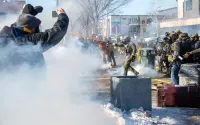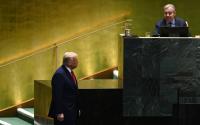29 October 2007Yahoo! NewsAdam Entous
Israel's attorney general told the government on Monday it could not cut electrical power to the Gaza Strip as part of its sanctions against the Hamas controlled territory, although he did approve other measures.
Israel began implementing economic sanctions on Sunday in what it said was a response to Palestinian rocket fire on Israeli towns from the Hamas-controlled coastal enclave.
Israel's supreme court told the government to explain its planned actions against Gaza and Attorney General Menachem Mazuz said the plan to reduce power to Gaza needed further scrutiny because of the possible impact on the population.
"The attorney general has approved the cabinet's decision to activate various economic steps ... (but) further consideration needs to be given to cutting off electricity because of the humanitarian implications on the civilian population," a Justice Ministry statement said.
Israel has begun to reduce fuel supplies, which defense officials said would be cut by up to 14 percent, depending on the type of fuel.
The European Union warned Israel against imposing "collective punishment" on the 1.5 million Palestinians in the coastal strip by reducing the territory's fuel supplies.
"We understand the distress that is caused in Israel by the continuing rocket attacks from Gaza," Benita Ferrero-Waldner, the EU's commissioner for external relations, said after meeting Israeli Prime Minister Ehud Olmert in Jerusalem.
But she told Reuters the new sanctions "will have very grave consequences for the life of the local population" and serve to bolster Hamas and other militant groups. "There should not be collective punishment," she added.
DELIVERIES DOWN
Palestinian officials said on Sunday that deliveries of fuel oil for Gaza's power station, as well as of diesel and petrol, were being cut from a quarter to a half.
An official from the European Union, which funds fuel oil to Gaza's only electricity generating plant, said deliveries to the plant were down by about a quarter on Sunday but that it had stocks for about seven days of operation.
Israeli defense officials said the power plant would receive enough fuel to continue operating.
Palestinian Prime Minister Salam Fayyad said after meeting Ferrero-Waldner that Israel's measures were "hurting our people in the Gaza Strip."
Hamas, which seized the Gaza Strip by force from rival Fatah in June, condemned what it called Israel's "blackmail" and forecast an "explosion" that would have an effect across the Middle East.
Israel has refused to deal with Hamas and last month designated the Gaza Strip an "enemy entity" but it cooperates with Fatah in the West Bank.
Fayyad added that the Palestinian Authority was ready to take control of the border crossings between the Gaza Strip and Israel "to ensure that goods begin to flow and people are able to move again."
Olmert, weakened by last year's war in Lebanon, faces opposition within his cabinet over peace talks with Palestinian President Mahmoud Abbas, whose secular Fatah faction remains in power in the occupied West Bank.
"This development would certainly only play into the hands of those who are trying to derail the ongoing negotiations between the parties," Ferrero-Waldner said.
Makeshift rockets have killed two Israelis this year.
(Additional reporting by Ori Lewis and Dan Williams in Jerusalem and Mohammed Assadi in Ramallah)






